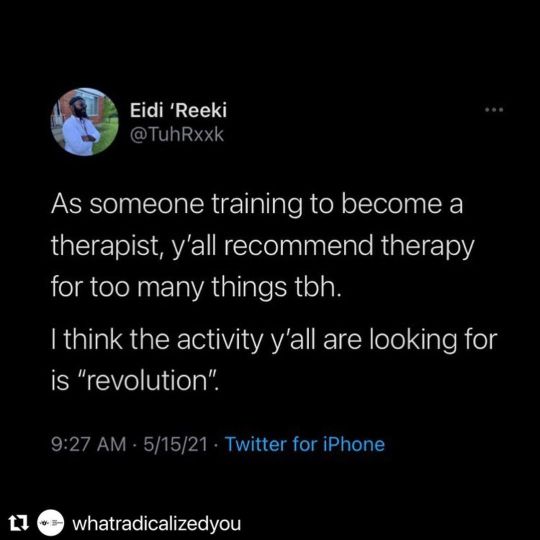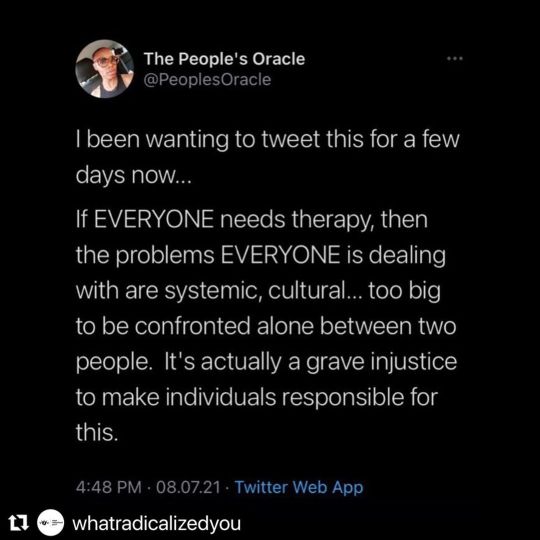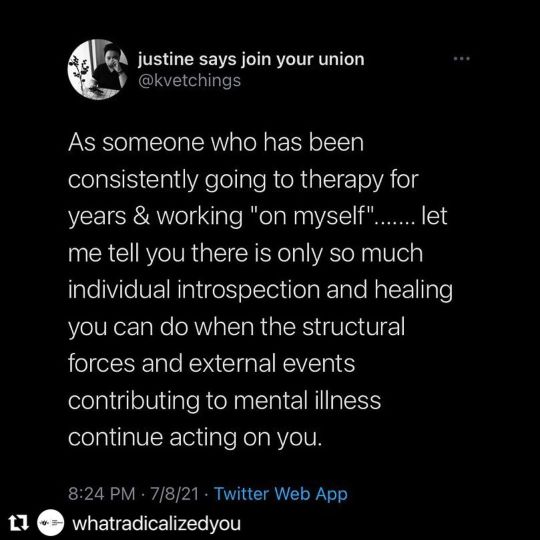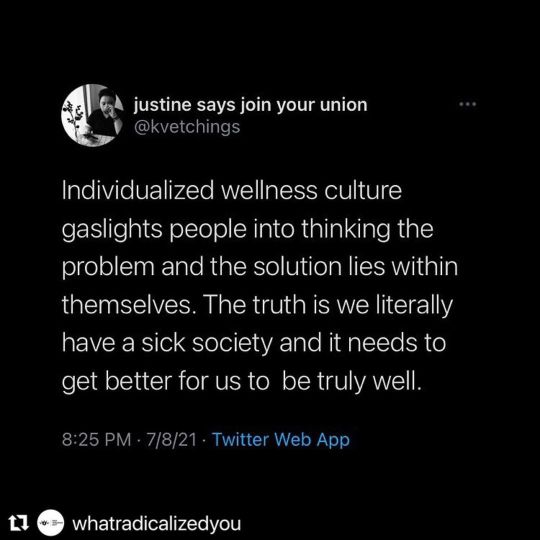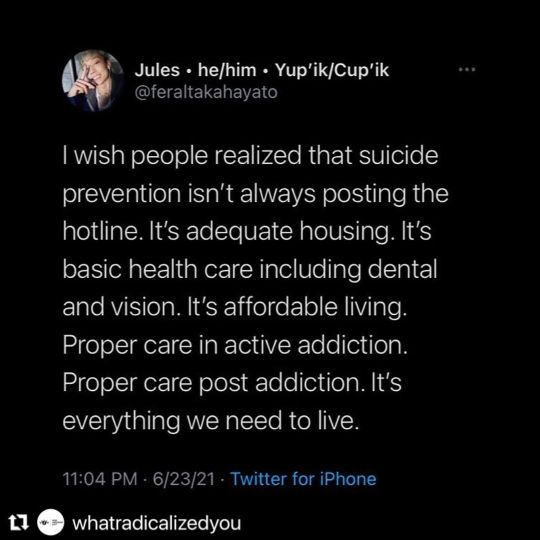25+, They/them, doin' my best to be kind. ☆ I browse tumblr most often, but I reblog to my side acc. and post art to the accounts below. ☆☆☆☆☆☆☆☆☆☆☆☆☆☆☆☆☆☆☆☆☆ https://www.instagram.com/brobin_dragon/ ... https://twitter.com/brobin_dragon
Last active 60 minutes ago
Don't wanna be here? Send us removal request.
Text
I think my general thought process with interacting with other people online is like yeah you have really cool art. You have really cool writing. You're really good at that thing you're posting about, but are you nice?
2K notes
·
View notes
Text
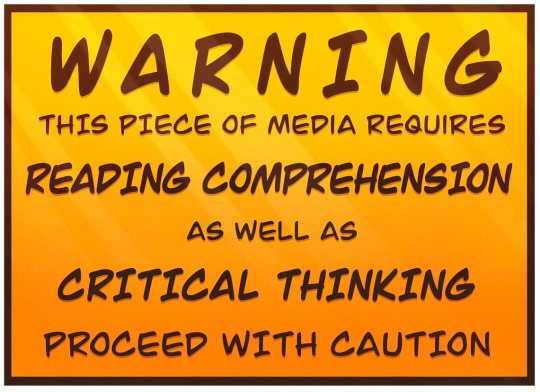
made a sticker for anyone to slap onto their work if they need to
26K notes
·
View notes
Text
The Three Commandments
The thing about writing is this: you gotta start in medias res, to hook your readers with action immediately. But readers aren’t invested in people they know nothing about, so start with a framing scene that instead describes the characters and the stakes. But those scenes are boring, so cut straight to the action, after opening with a clever quip, but open in the style of the story, and try not to be too clever in the opener, it looks tacky. One shouldn’t use too many dialogue tags, it’s distracting; but you can use ‘said’ a lot, because ‘said’ is invisible, but don’t use ‘said’ too much because it’s boring and uninformative – make sure to vary your dialogue tags to be as descriptive as possible, except don’t do that because it’s distracting, and instead rely mostly on ‘said’ and only use others when you need them. But don’t use ‘said’ too often; you should avoid dialogue tags as much as you possibly can and indicate speakers through describing their reactions. But don’t do that, it’s distracting.
Having a viewpoint character describe themselves is amateurish, so avoid that. But also be sure to describe your viewpoint character so that the reader can picture them. And include a lot of introspection, so we can see their mindset, but don’t include too much introspection, because it’s boring and takes away from the action and really bogs down the story, but also remember to include plenty of introspection so your character doesn’t feel like a robot. And adverbs are great action descriptors; you should have a lot of them, but don’t use a lot of adverbs; they’re amateurish and bog down the story. And
The reason new writers are bombarded with so much outright contradictory writing advice is that these tips are conditional. It depends on your style, your genre, your audience, your level of skill, and what problems in your writing you’re trying to fix. Which is why, when I’m writing, I tend to focus on what I call my Three Commandments of Writing. These are the overall rules; before accepting any writing advice, I check whether it reinforces one of these rules or not. If not, I ditch it.
1: Thou Shalt Have Something To Say
What’s your book about?
I don’t mean, describe to me the plot. I mean, why should anybody read this? What’s its thesis? What’s its reason for existence, from the reader’s perspective? People write stories for all kinds of reasons, but things like ‘I just wanted to get it out of my head’ are meaningless from a reader perspective. The greatest piece of writing advice I ever received was you putting words on a page does not obligate anybody to read them. So why are the words there? What point are you trying to make?
The purpose of your story can vary wildly. Usually, you’ll be exploring some kind of thesis, especially if you write genre fiction. Curse Words, for example, is an exploration of self-perpetuating power structures and how aiming for short-term stability and safety can cause long-term problems, as well as the responsibilities of an agitator when seeking to do the necessary work of dismantling those power structures. Most of the things in Curse Words eventually fold back into exploring this question. Alternately, you might just have a really cool idea for a society or alien species or something and want to show it off (note: it can be VERY VERY HARD to carry a story on a ‘cool original concept’ by itself. You think your sky society where they fly above the clouds and have no rainfall and have to harvest water from the clouds below is a cool enough idea to carry a story: You’re almost certainly wrong. These cool concept stories work best when they are either very short, or working in conjunction with exploring a theme). You might be writing a mystery series where each story is a standalone mystery and the point is to present a puzzle and solve a fun mystery each book. Maybe you’re just here to make the reader laugh, and will throw in anything you can find that’ll act as framing for better jokes. In some genres, readers know exactly what they want and have gotten it a hundred times before and want that story again but with different character names – maybe you’re writing one of those. (These stories are popular in romance, pulp fantasy, some action genres, and rather a lot of types of fanfiction).
Whatever the main point of your story is, you should know it by the time you finish the first draft, because you simply cannot write the second draft if you don’t know what the point of the story is. (If you write web serials and are publishing the first draft, you’ll need to figure it out a lot faster.)
Once you know what the point of your story is, you can assess all writing decisions through this lens – does this help or hurt the point of my story?
2: Thou Shalt Respect Thy Reader’s Investment
Readers invest a lot in a story. Sometimes it’s money, if they bought your book, but even if your story is free, they invest time, attention, and emotional investment. The vast majority of your job is making that investment worth it. There are two factors to this – lowering the investment, and increasing the payoff. If you can lower your audience’s suspension of disbelief through consistent characterisation, realistic (for your genre – this may deviate from real realism) worldbuilding, and appropriately foreshadowing and forewarning any unexpected rules of your world. You can lower the amount of effort or attention your audience need to put into getting into your story by writing in a clear manner, using an entertaining tone, and relying on cultural touchpoints they understand already instead of pushing them in the deep end into a completely unfamiliar situation. The lower their initial investment, the easier it is to make the payoff worth it.
Two important notes here: one, not all audiences view investment in the same way. Your average reader views time as a major investment, but readers of long fiction (epic fantasies, web serials, et cetera) often view length as part of the payoff. Brandon Sanderson fans don’t grab his latest book and think “Uuuugh, why does it have to be so looong!” Similarly, some people like being thrown in the deep end and having to put a lot of work into figuring out what the fuck is going on with no onboarding. This is one of science fiction’s main tactics for forcibly immersing you in a future world. So the valuation of what counts as too much investment varies drastically between readers.
Two, it’s not always the best idea to minimise the necessary investment at all costs. Generally, engagement with art asks something of us, and that’s part of the appeal. Minimum-effort books do have their appeal and their place, in the same way that idle games or repetitive sitcoms have their appeal and their place, but the memorable stories, the ones that have staying power and provide real value, are the ones that ask something of the reader. If they’re not investing anything, they have no incentive to engage, and you’re just filling in time. This commandment does not exist to tell you to try to ask nothing of your audience – you should be asking something of your audience. It exists to tell you to respect that investment. Know what you’re asking of your audience, and make sure that the ask is less than the payoff.
The other way to respect the investment is of course to focus on a great payoff. Make those characters socially fascinating, make that sacrifice emotionally rending, make the answer to that mystery intellectually fulfilling. If you can make the investment worth it, they’ll enjoy your story. And if you consistently make their investment worth it, you build trust, and they’ll be willing to invest more next time, which means you can ask more of them and give them an even better payoff. Audience trust is a very precious currency and this is how you build it – be worth their time.
But how do you know what your audience does and doesn’t consider an onerous investment? And how do you know what kinds of payoff they’ll find rewarding? Easy – they self-sort. Part of your job is telling your audience what to expect from you as soon as you can, so that if it’s not for them, they’ll leave, and if it is, they’ll invest and appreciate the return. (“Oh but I want as many people reading my story as possible!” No, you don’t. If you want that, you can write paint-by-numbers common denominator mass appeal fic. What you want is the audience who will enjoy your story; everyone else is a waste of time, and is in fact, detrimental to your success, because if they don’t like your story then they’re likely to be bad marketing. You want these people to bounce off and leave before you disappoint them. Don’t try to trick them into staying around.) Your audience should know, very early on, what kind of an experience they’re in for, what the tone will be, the genre and character(s) they’re going to follow, that sort of thing. The first couple of chapters of Time to Orbit: Unknown, for example, are a micro-example of the sorts of mysteries that Aspen will be dealing with for most of the book, as well as a sample of their character voice, the way they approach problems, and enough of their background, world and behaviour for the reader to decide if this sort of story is for them. We also start the story with some mildly graphic medical stuff, enough physics for the reader to determine the ‘hardness’ of the scifi, and about the level of physical risk that Aspen will be putting themselves at for most of the book. This is all important information for a reader to have.
If you are mindful of the investment your readers are making, mindful of the value of the payoff, and honest with them about both from the start so that they can decide whether the story is for them, you can respect their investment and make sure they have a good time.
3: Thou Shalt Not Make Thy World Less Interesting
This one’s really about payoff, but it’s important enough to be its own commandment. It relates primarily to twists, reveals, worldbuilding, and killing off storylines or characters. One mistake that I see new writers make all the time is that they tank the engagement of their story by introducing a cool fun twist that seems so awesome in the moment and then… is a major letdown, because the implications make the world less interesting.
“It was all a dream” twists often fall into this trap. Contrary to popular opinion, I think these twists can be done extremely well. I’ve seen them done extremely well. The vast majority of the time, they’re very bad. They’re bad because they take an interesting world and make it boring. The same is true of poorly thought out, shocking character deaths – when you kill a character, you kill their potential, and if they’re a character worth killing in a high impact way then this is always a huge sacrifice on your part. Is it worth it? Will it make the story more interesting? Similarly, if your bad guy is going to get up and gloat ‘Aha, your quest was all planned by me, I was working in the shadows to get you to acquire the Mystery Object since I could not! You have fallen into my trap! Now give me the Mystery Object!’, is this a more interesting story than if the protagonist’s journey had actually been their own unmanipulated adventure? It makes your bad guy look clever and can be a cool twist, but does it mean that all those times your protagonist escaped the bad guy’s men by the skin of his teeth, he was being allowed to escape? Are they retroactively less interesting now?
Whether these twists work or not will depend on how you’ve constructed the rest of your story. Do they make your world more or less interesting?
If you have the audience’s trust, it’s permissible to make your world temporarily less interesting. You can kill off the cool guy with the awesome plan, or make it so that the Chosen One wasn’t actually the Chosen One, or even have the main character wake up and find out it was all a dream, and let the reader marinate in disappointment for a little while before you pick it up again and turn things around so that actually, that twist does lead to a more interesting story! But you have to pick it up again. Don’t leave them with the version that’s less interesting than the story you tanked for the twist. The general slop of interest must trend upward, and your sacrifices need to all lead into the more interesting world. Otherwise, your readers will be disappointed, and their experience will be tainted.
Whenever I’m looking at a new piece of writing advice, I view it through these three rules. Is this plot still delivering on the book’s purpose, or have I gone off the rails somewhere and just stared writing random stuff? Does making this character ‘more relateable’ help or hinder that goal? Does this argument with the protagonists’ mother tell the reader anything or lead to any useful payoff; is it respectful of their time? Will starting in medias res give the audience an accurate view of the story and help them decide whether to invest? Does this big twist that challenges all the assumptions we’ve made so far imply a world that is more or less interesting than the world previously implied?
Hopefully these can help you, too.
3K notes
·
View notes
Text
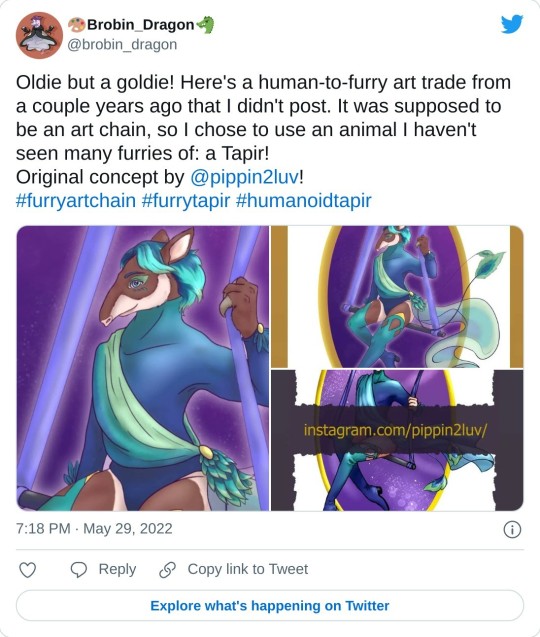
Link to my profile bc that's where I post haha
17 notes
·
View notes
Text
https://twitter.com/brobin_dragon/status/1530989872277663744?t=bndhyjc_THkuNGpv9gwTmQ&s=19
Gift art for @theslowesthnery ! They use a Vulkin, from Undertale, for their icon. They seem cool and have sweet art, plus we have a mutual appreciation for troubled monster men haha
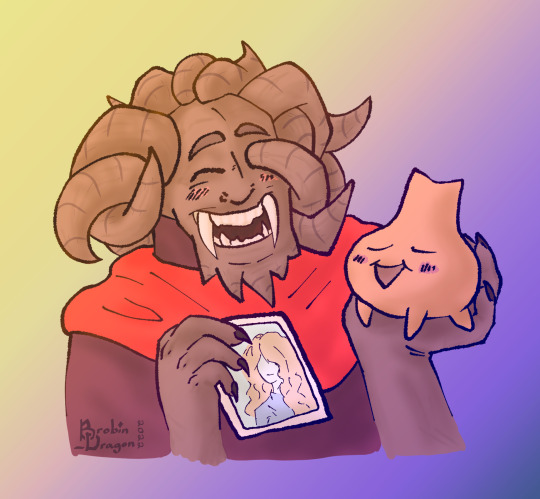
12 notes
·
View notes
Text
Monstrous Love
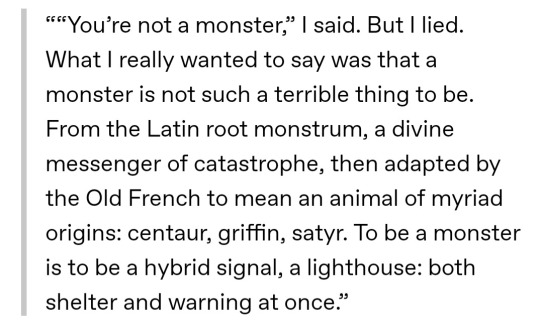


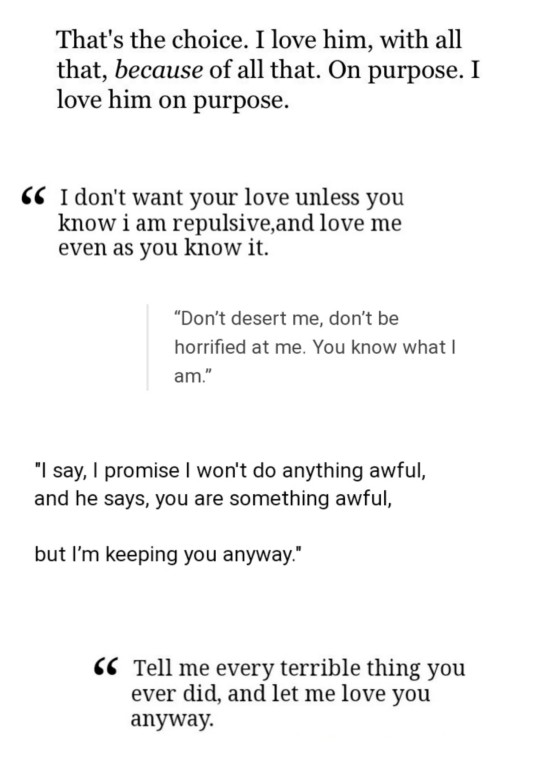
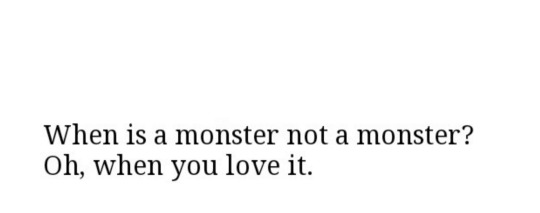
~
Ocean Vuong, On Earth We’re Briefly Gorgeous // Fortesa Latifi, We Want To Be Ruined // Mashmello, Silence // Richard Siken, A Primer of the Small Weird Loves // Guillermo del Toro, Crimson Peak // Leah Reader, Black Iris // Azra T., via thelovejournals // Florence and the Machine, Howl // Helen Cixous, Stigmata: Escaping Texts // Casey MxQuiston, Red, White & Royal Blue // Georges Bataille // Charlotte Bronte, in a letter to Ellen Nussey // Yves Olade, Bloodsport // Andria Zabala, Coffee and Cigarettes // Caitlyn Siehl, Start Here
#omg is this a love letter from OP to me specifically and purposefully?!#(no)#(i'm screenshotting all of this though)
5K notes
·
View notes
Text
Mutuals this, mutuals that
Shout out to the people I follow who didn’t want to follow me back
I respect your decision and love your work
You will never see this post
46K notes
·
View notes
Text
ive worn heart shaped glasses for almost 4 years and they are just like my Thing and i love them so much and so often people will say shit like Oh Id Love To Wear Something Like That But I Could Never Pull It Off and like... babe no one can theyre heart shaped glasses u dont wear them to look flattering or stylish or whatever u wear them to make ur soul happy
113K notes
·
View notes
Text
shoutout to disabled people who aren’t exactly sure what their disability is, disabled people who aren’t diagnosed yet but know something’s off, and disabled people who are struggling but can’t get any help because of a lack of diagnosis, access to resources, or anything else. shoutout to disabled people who are silently and invisibly disabled and have a hard time getting people to believe them, and who have difficulty managing their symptoms because they’re not sure what the problem is stemming from. it’s hard, but i see you, and im so glad you’re here. it’s over-said but your experience is valid. you deserve support and to be believed.
9K notes
·
View notes
Text
Fandom Etiquette
I’ve been around for a really long time in various fandoms, and no one ever writes this stuff down. I’ll start. Please add to the list. We can’t expect people to follow “rules” they don’t know exist.
written with the help of @unbreakablejemmasimmons
Fanart
if you like something, reblog it. Help the artist get their work out there in front of more people. Share the joy that it brought you.
if you want more of it, support it. This can be via commissions, reblogs, recommending the artist to other people, shouting in the tags, or sending the artist asks/messages.
if you hate it, keep scrolling. Keep the hate in a message window with a friend, not in the artist’s notes.
if you want to use it, ask permission. Artwork is beautiful and you want to show it off. But please ask the artist before you throw it into your header or your icon.
if you use it, give credit. And not just a post where you say “Do you like my new icon? X made it!”. Put it in your blog description, that way when someone rolls around your blog three months from now, they also know where your icon/header came from.
Fanfic
if you like something, reblog it. Help the author get their work out there in front of more people. Share the joy that it brought you.
if you want more of it, support it. Kudos are fine, but if you want more of the thing you like, you should comment. Subscribe to the story or the author. Send them a message about how much you like what they wrote.
if you read it, kudos it. Or give it a thumbs up. And this is just if you managed to get all the way to the end. If you finished the story and you actually liked it? Comment and reblog.
don’t demand content. Be patient. Stories take time. You can encourage without being demanding. Show your love for what’s there without telling them to post more often.
be gentle with criticism. Some people want it and some people run away from it. If you don’t know what type of person the author is, it’s best not to go there. “If you can’t say something nice, don’t say anything.”
Fandom
ship and let ship. You love your ship and other people love theirs. No one needs to “win” when we’re all going to end up in tears anyway.
if you hate it, stay out of the tag. This has two meanings: 1) don’t deliberately put hateful commentary in a tag and 2) if you hate a tag, don’t go and read through that tag just to make yourself angry
if someone makes you something, appreciate it. Read and comment the fic. Like and reblog the artwork. Pimp it out and tell them how much you loved it. It’s a gift, treat it like one.
if it’s a gift, put some effort into it. You signed up for that exchange three months ago and now it’s a week before you have to send the gift and you don’t have the time or the inclination to do the thing. Well too bad. Someone out there has been working hard in your gift, so you should do the same for them.
none of us are “better” than anyone else. We’re all trash for our particular show/film/book/ship/artist/what-have-you. My fave is no better than yours and yours is no better than mine.
actors are not their characters. They are people. Treat them like people.
42K notes
·
View notes
Text
maybe this fandom is awful to YOU. im having a lovely time looking nowhere but my little corner and curating my online experience
45K notes
·
View notes
Text
I think that's fair. I have always been 100% bothered by random people saying hon(ey), babe, etc but after a year or two into the relationship with my partner we started using love, my love(y) and sweetheart for each other. It's rare that we use our actual names for each other, but that's kinda how we prefer it. It's like a private one-person-use-only thing for us. Took longer - still rarely even now, many years later - to even use nicknames around other people tbough and I'm only mostly okay/not shy. My partner has always used "___ okay, boss." for his buds and stuff which I find amusing and I think is his equivalent of "hon(ey)" haha
So like... yeah, you're not missing out because it's just how some people show affection in whatever degree works for them for whoever they're talking to. Plus different PDA-comfort levels. And if you're not comfortable/don't like it, of course it's just going to be a negative experience! And...
it kinda just highlights how, if someone does that - and they're someone you actually WANT to talk to and be with otherwise - ya just.... communicate that it's not your jam. Maybe compromise to like... a nickname, or "m' friend" (that's what I do sometimes ha) if it they say it's really important for them. Or do the whole silent thing! Like "Hey, you don't like <PDA> and I want to shout out how much I love you as much as freaking possible. Can I like.... tap your shoulder or squeeze your hand 3 times so that I can say I love you without it being obvious?" ... As an example.
...
Okay btw this is mostly directed at whoever might be confused why peeps might not like casual PDA (romantic or otherwise). Hope it helps/makes sense despite the rambling nature. Anyway carry on hope y'all have a great day and stuff
Maybe it’s because I’m the opposite of a romantic but if someone ever called me “my love” I think I’d just squint at them.
#Canadian btw#idk if that matters#a lot of talk about nicknames and stuff SEEMS to be from USAmericans so I wanted to like... make it clear#damn I haven't written anything on tumblr in a while huh#brobinshush
490 notes
·
View notes
Text
I don’t think it’s as bad as it used to be but I still sometimes see people say that art should be done for art’s sake and artists shouldn’t have a need for their viewers to engage with the art or “spread the word”
Thing is, at least in my case, the art is already in my head. It’s very vivid and quite frankly probably better than I could ever draw or write it. There’s only one single reason for me to put it into the world and that is to share it with other people. If I just made it and put it in a dark hole it’s no different than just keeping it in my head.
Sure, I might only have made it as practice but even then I’m not going to learn half as much if I don’t get feedback. And contrary to what some people might believe, even if you only get positive feedback you still learn because you see what people respond to.
If people don’t want anyone to interact with their art they simply don’t post it. If it’s out there it’s because they hope someone will like it, and if you like it it’s important to let them know if you want to see more of it. Even if you’re sitting down in that dark hole admiring the art, eventually the art will stop coming because the creator think there’s nobody down there.
804 notes
·
View notes
Text
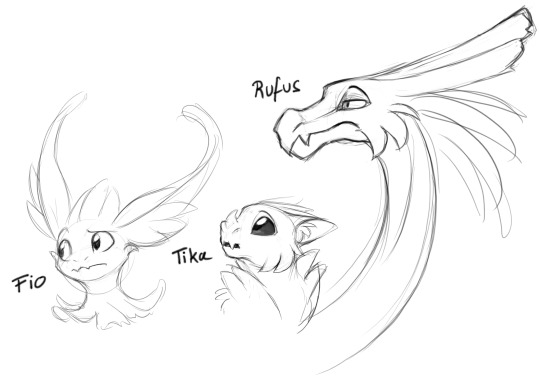
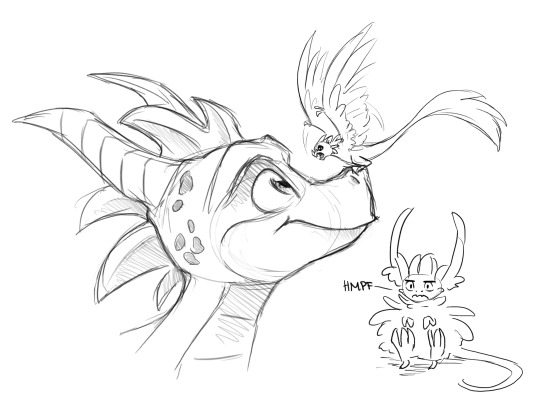
Some sketches and two Patreon requests I did in my last stream! :D To my delight we talked mainly about my three dragon protagonists pictured above from my last novel and the whole stream ended up being dragon-themed :DD But we sTILL managed to sneak in Dusk somehow, trying on Spyros color scheme:
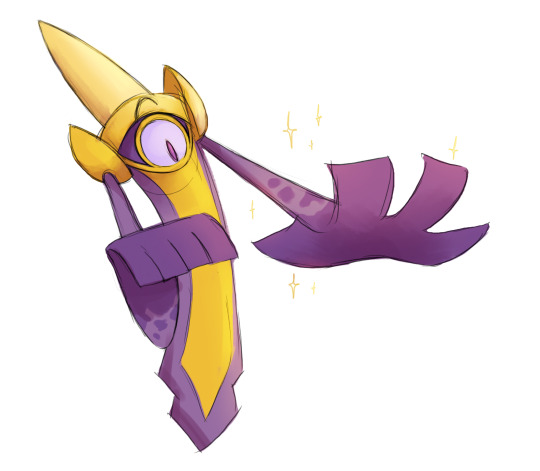
429 notes
·
View notes
Text
I finally redownloaded tumblr on my new phone and, compared to browsing instagram and twitter, can honestly say this just feels better. No random recommended posts, ads are obvious, and the people I follow here actually post way more random chatter and etc than the other sites yet is more interesting..... Seems like I'll be here to browse and stay, even if I try to post original content mainly elsewhere for #TheViews ha
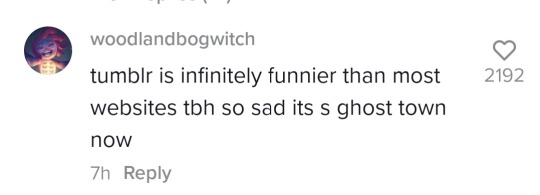
215K notes
·
View notes

